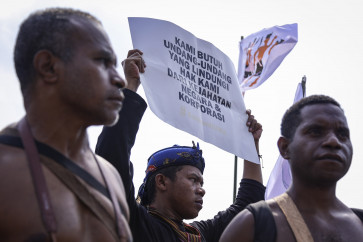Popular Reads
Top Results
Can't find what you're looking for?
View all search resultsPopular Reads
Top Results
Can't find what you're looking for?
View all search resultsDecolonizing climate and environmental justice: Lessons from indigenous communities
Development programs, including those branded as “green” or “low-carbon”, have often dispossessed indigenous communities of their ancestral lands.
Change text size
Gift Premium Articles
to Anyone
 A member of an indigenous community holds a poster that reads “We need regulations that protect our rights from state and corporate crimes“ on Oct. 11, 2024, during a protest in front of the Senayan Legislative Complex in Jakarta. The protesters demanded that lawmakers push for protection of indigenous communities' rights as well as the resolution of agrarian conflicts. (Antara/Dhemas Reviyanto)
A member of an indigenous community holds a poster that reads “We need regulations that protect our rights from state and corporate crimes“ on Oct. 11, 2024, during a protest in front of the Senayan Legislative Complex in Jakarta. The protesters demanded that lawmakers push for protection of indigenous communities' rights as well as the resolution of agrarian conflicts. (Antara/Dhemas Reviyanto)
A
t the international conference themed “Decolonizing Social Sciences and Humanities: Islamic and Non-Western Perspectives” organized by the Indonesian Islamic International University (UIII), scholars gathered to challenge Eurocentric paradigms and elevate diverse traditions of thought from Islamic, African, Asian and indigenous perspectives.
This effort reflects a growing global momentum to rethink dominant narratives, including in climate and environmental discourse. For too long, climate solutions have been shaped by Western frameworks that often ignore colonial histories and sideline Indigenous worldviews. Decolonizing climate policy means recentering those voices that have lived in reciprocal relationship with nature—often under conditions of systemic erasure—and ensuring their knowledge and rights are not just acknowledged but integrated into meaningful climate action.
A core assumption in mainstream climate discourse is that the current crisis began in the Anthropocene Epoch—marked by intensified industrial activity and human impact on Earth systems. However, many Indigenous scholars and communities argue that this framing obscures the deeper historical roots of the crisis, namely colonialism and the violent transformation of ecosystems and societies in service of empire.
The Anthropocene, as a scientific concept, focuses on how human activity has accelerated carbon emissions, biodiversity loss and ecological breakdown since the mid-20th century. But it tends to treat “humanity” as a homogenous actor, flattening the differences between those who have driven extraction and those who have been dispossessed by it.
As the art historian and indigenous studies scholar Jessica L. Horton notes, the crisis is not caused by all humans equally, but by a minority of actors whose domination was resisted by others. Ignoring this history risks erasing the voices of those most impacted.
This is where the calls to decolonize climate policy come in. Indigenous thinkers argue that the path forward lies not in returning to some pre-industrial “pure” state, but in restoring land, cultural sovereignty and self-determination to Indigenous peoples. Climate solutions must not replicate the very structures—colonialism, capitalism, extractivism—that caused the crisis in the first place.
At the heart of this critique is a different understanding of human-nature relationships. Where Western development models desacralize nature—seeing mountains as gravel, lakes as factory coolant, rivers as a garbage bin, forests as carbon sinks and oceans as international waterways—many indigenous worldviews emphasize reciprocity, kinship and spiritual responsibility. These are not romantic ideals, but practical frameworks that have sustained ecosystems for generations.


















